#BFF 『Tangerine』 Sean Baker Interview
NeoL / 2017年1月21日 12時0分
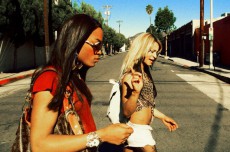
#BFF 『Tangerine』 Sean Baker Interview
ーーすごくダイナミックなデュオだった。タイプは違うんだけどお互いを補っていてね
Best Friends Forever特集2弾。スマートフォンで全編を撮影したとして世界中の映画祭で大きな話題を呼んだ映画『タンジェリン』が、1月28日より全国公開される。舞台は犯罪が多発するLAの悪評高い地域。クリスマスイブの一日を通して、2人のトランスジェンダーの女性たちの友情や恋愛がリアルかつポップに描かれた。監督、脚本、撮影、編集、プロデュースまでもこなし、演技未経験だった主演の2人を見事に輝かせたのは、今作が監督5作目となるショーン・ベイカー。先日プロモーション来日した彼に、今作の誕生秘話を聞いた。
—日本でもアメリカの映画はたくさん公開されているのですが、今作で描かれているのは、多くの日本人が知らないアメリカの一面かもしれません。どうしてこの物語を伝えようと思ったのですか?
ショーン「僕は人生の大半をニューヨークで育って、2012年にロサンゼルスに引っ越したんだ。LAはものすごくデカい街で、ハリウッドのメインストリームの業界や、映画やテレビではあまり取り上げられていないコミュニティーや小さなミクロコスモスがたくさんあった。それで、やらない手はないな、と思った」
—なるほど。
ショーン「本当にすぐそこなんだよ。ドーナツ・タイムはスタジオから1ブロックしか離れていないんだ。車で通るだけで誰も知ろうとしないエリアなんて、不思議だなと思っていた。それで探求したくなったんだ。あそこは非公式なレッドライト地区(※売春の多い地区)のような場所で、ここ10年ほどはトランスジェンダーの売春婦が多い。きっとたくさんの物語があるはずだと思っていた。
そこでプロデューサーに電話して、『サンタモニカとハイランドの交差点』についての映画を作りたいと話した。文字通り、僕が言ったのはそれだけ。彼はすぐに理解してくれて、『わかった、完璧だね、許可する』と言われた。
そこから僕と共同ライターのクリス・バーゴッチはリサーチする必要があった。あのエリアについてよく知らなかったから、ただ適当に話を作るわけにはいかないからね。それでリサーチを始めたんだけど、驚くべきことがたくさんあったよ。マイヤとキキにも会えたしね。マイヤがみんなに紹介してくれたんだ」
—マイヤとはどのように出会ったのですか?
ショーン「彼女はドーナツ・タイムから1ブロックのところにある、LGBTセンターにいたんだ。僕らはストリートの女性や地域の住人に話しかけていたんだけど、警察やジャーナリストだと疑われて全く進まなかった。それで、LGBTセンターなら人に話しかけやすいと思ったんだ。すてきな中庭まであって、地域の困窮している若者をサポートしている場所だから、話せる人がいるだろうとわかっていた」
—そこにマイヤがいたわけですね。
ショーン「ああ、中庭の向こうにマイヤがいて、『すごい!なんて個性的なんだ!』と思った。それで近づいていって、『やあ、僕らは映画を制作するんだ。この地域や君の人生経験について知りたいんだけど』と話したんだ。すると彼女は、『わかった!いいよ!私は歌手なの。だから歌いたいわ!』って(笑)。『OK、ミュージカルじゃないけど、劇中で君が歌える方法を考えてみるよ』と伝えたよ」
—キキとの出会いは?
ショーン「僕らはマイヤとファーストフードの店で会うようになって、そこでの暮らしについて、いろんな話を聞いていたんだ。ある日、マイヤから『私の友だちに会ってほしいの。彼女は役者なのよ』と言われた。それでキキがやって来たんだけど、実際には高校時代に演劇をやっていただけだったんだよね。でもみんなの間ではパフォーマーとして見なされていたんだ。その時にあの2人が一緒にいるのを初めて見たんだ。すごくダイナミックなデュオだった。タイプは違うんだけどお互いを補っていて、お互いの話にオチをつけたりしてね。可能性を感じて、もし彼女たちに演じることができたら、これで決まりだなと思ったんだ」
—彼女たちは普段からあんな感じなのですか?
ショーン「ウィットやワクワク感とか、ユーモアやエネルギーといった意味では、あのままだよ。でもキキはシンディには似ていない。決して凶暴ではないよ(笑)。彼女は仲間内以外ではシャイで内気なんだ」
—ということは、演技が上手なんですね。
ショーン「そうだね。彼女はすばやくオンとオフを使い分けることができるんだ。2人に会った時は、みんなから聞いた話をもとにプロットを考えている段階だった。彼女たちには最初から、すべてのステージにおいて承認してほしいと伝えたよ。それはとても重要なことだった。僕らはあの世界の外に生きる、シスジェンダーの白人男性だからね。すべての映画でやってきたことだけど、特に今作では重要だった。トランスジェンダーのセックスワーカーに敬意を払って、ちゃんと彼女たちの意見を取り入れて語られた物語は少なかったから。
それで彼女たちに7ページのトリートメントを見せたら、とても気に入ってくれたんだ。いくつかコメントはあったけど、制作過程で調整して、ワークショップも開いた。ポスプロの段階でも、少なくともキキは編集室に来て意見を出してくれたり、とても協力的だった」
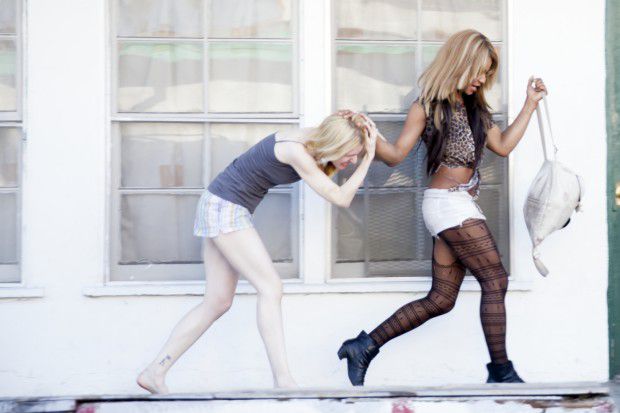
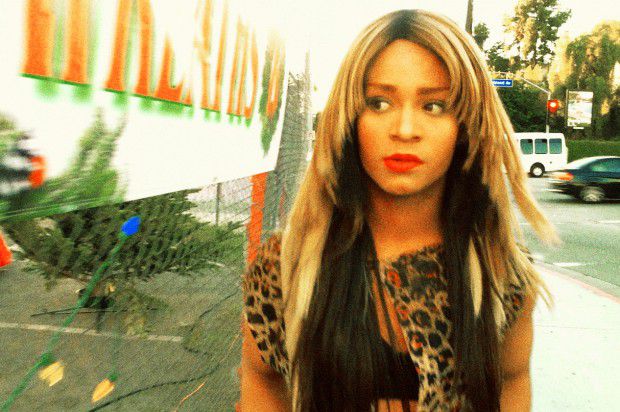
—彼女たちにはどのような演出をしましたか?
ショーン「過去の作品を観てもらって、僕の感性を理解してもらったんだ。リアリズムに基づいているから、リアルでありながら、観客を楽しませなければならなかった。でも実際にはマイヤの方から、『この映画はあなたの他の作品よりも笑えるものにしたい!』って言われたんだよ(笑)。『ここで生きる女性たちがどれだけ苦労をしているのか見せたいわ。でも同時に、すごく笑える作品にしてちょうだい』と言われた。それってバランスが難しいから、大変なことになるなと思ったよ。
でも、実際には彼女が正しかったんだ。レストランで一緒に過ごしていると、彼女たちは本当に面白いんだ。いつもユーモアで問題を乗り越えていたよ。それで、あのユーモアを作品に吹き込まなければ、噓になってしまうと思った。そこからは、常にコメディと苦しみのバランスを考えなければならなかった」
—彼女たちの人生はタフなのに、映画はすごく笑えて、絶妙な軽さがありますよね。
ショーン「どのような反応になるか、正直わからなかったよ。50/50かなと思っていた。大好きか嫌いか、どちらかだろうって。でも広く受け入れてもらえた。心から描かれた作品で、決して彼らをバカにしていないということが伝わったんだろうね。
今作では人生における本物のユーモアを観ることができるんだ。時にそのユーモアは悲劇的なところから来ているのだけど、誰だって悲劇的なことに直面するし、ユーモアで乗り越えたりするよね。そういうことをやってのける監督は何人かいるよ。アレクサンダー・ペインの『ネブラスカ ふたつの心をつなぐ旅』は悲劇的だろう? でも同時に、終始笑いが止まらないんだ。ラース・フォン・トリアーも常にやっている。リアルな人生を反映しているから、そういったスタイルやトーンが僕には響くんだ」
—劇中の2人の会話がリアルで面白かったです。アレクサンドラがシンディに「あの娘をクリス・ブラウンする(=ボコボコにする)必要はなかったんじゃない?」というシーンは最高でした。
ショーン「あれは脚本通りなんだ(笑)。僕が書いたんだけど、いまだにビクビクしているよ。いつかクリス・ブラウンに顔面パンチされるんじゃないかと思って!」
—彼女たちのアドリブはありましたか?
ショーン「いくつか素晴らしい台詞があったよ。たとえばマイヤが車内で客を相手にしているシーンで、相手が『本当はやりたいくせに』とか言うと、彼女が『私のことをお見通しなのね?』って言うんだ。あれは良い台詞だったというだけでなく、LGBTの批評家たちから重要な台詞として取り上げられた。セックスワーカーの観点から描かれるやりとりは、映画ではほとんど観られないからね。だから、彼女たちは笑える台詞を言っただけでなく、そこに自分たちの意見も吹き込んでいたんだ。それはとても重要なことだと思う」
—マイヤの歌のシーンも良かったです。夢がかなったわけですよね?
ショーン「でも、僕らが選んだ歌を嫌がっていたよ(笑)。彼女はマライア・キャリーを歌いたかったんだ!」
—とはいえ、ドリーミーで美しいシーンでした。
ショーン「ありがとう。撮影は楽しかったよ。彼女が歌った“Toyland”は、有名なクリスマスのミュージカル映画『Babes in Toyland』からの曲なんだ。僕にとっては思い出深い特別な曲なんだよ。でも彼女は『なんで私がこれ歌わなきゃいけないの?』って感じだった。だけど上手だったし、最終的にはとても満足してくれた。それにサウンドトラックにも収録されたから、とても喜んでくれた」
—ラストシーンでは演じるのを恥ずかしがっていたそうですが、2人とも素晴らしかったです。
ショーン「彼女たちは素晴らしかったよ。1テイクしか撮らなかったんだ。デジタルファイルを失くすかもしれないし、何か失敗するかもしれないから、本当は危険なんだけどね。でも、彼女たちにもう一度やらせることはできなかった。だって、あれは演技以上のものだったから。あの構図は僕が望んだ通りだった。でも、あんなにもパワフルな演技をしてくれるとは思っていなかったんだ。自分の現場で感情的になることはないんだけど、あの時だけはウルっとしたよ。彼女たちの演技が信じられなくてね。素晴らしかったよ」
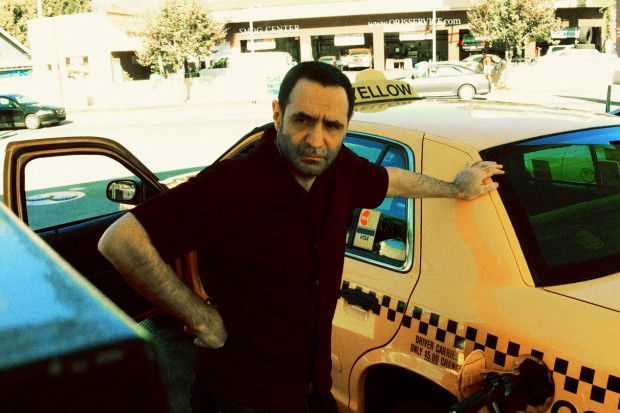
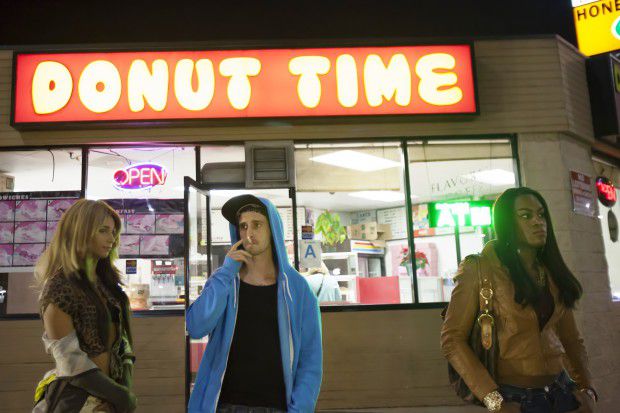
—今作がiPhoneで撮影されたことを強調しているレビューが多かったのですが、正直言って、見始めて数分でそんなことは忘れてしまいました。
ショーン「良かった!」
—なぜiPhoneで撮影したのですか?
ショーン「予算的な理由だったのだけど、すぐにiPhoneを使うことの利点が見えてきた。初めて演技する役者やアマチュアにとっては、威圧感が減るからね。誰でもスマホは持っているし、ストリートの無一文の女性たちだって持っているよ。だから顔にスマホを向けたところで、誰も気にしないんだ。でも、もし35ミリの巨大なカメラを向けたら、慣れるのに時間がかかるだろうからね。
それに、モバイルだからカメラを速く動かすことができた。過去の作品と比較すると、今作の方が動きが多いと思う。狭い場所に入れたのも良かった。ドーナツ・タイムは見た目よりも狭いからね」
—タイトルを『タンジェリン』にした理由は?
ショーン「ずっとタイトルが決まらなかったんだ。あまりわかりやすいものにはしたくなくて、文字通りではないタイトルを求めていた。何かイメージが頭に浮かぶようなものをね。それであのタイトルを思いついて、そのまま定着したんだ。みんながそれぞれ違った解釈をしていて、好きなようにとらえられるのも気に入った。それにあのフルーツの色彩もぴったりだと思えた。実際にポスプロで彩度を上げたら、あの色がドミナントカラーになったんだよ」
—この映画はLGBTについての映画ではなく、人間についての映画だと思いました。
ショーン「面白いのが、チェスター役のジェームズ・ランソンに言わせると、これは『LAについての映画』なんだ。別の人は『これはクリスマス映画だ』と言っていた。さらに別の人は『これはバディ(=相棒)ムービーだ』とね。だから、いろんな売り出し方ができると思う。でも僕としては、“現代のロサンゼルスを舞台にした娯楽作品”だと思っている(笑)。僕らはそう考えているんだ」
—今作の制作を通して得た最も大きなものは何だと思いますか?
ショーン「僕は自分の作品にはとても厳しいんだけど、今作ではすべての演技にとても満足している。キャスト全員に満足できたのは初めてだ。次に何をしたいのかわからなくて、正直言うと高予算のパペット映画を作ろうと思っていた。でもこの映画が僕の進路をはっきりさせてくれたよ。フロリダで撮影する次回作も同じ感性で描くんだ。子どもを主軸にした映画だけど、同じことをやろうとしている。もう少しこの得意分野に留まってみるよ。パペット映画を作る代わりにね(笑)」
interview & text Nao Machida
edit Ryoko Kuwahara
『タンジェリン』
1月28日(土)、渋谷シアター・イメージフォーラム他全国順次公開
©2015 TANGERINE FILMS, LLC ALL RIGHTS RESERVED
監督・編集・共同脚本・共同撮影:ショーン・ベイカー
共同脚本:クリス・バーゴッチ 共同撮影:ラディウム・チャン 製作総指揮:マーク・デュプラス、ジェイ・デュプラス
出演:キタナ・キキ・ロドリゲス、マイヤ・テイラー、カレン・カラグリアン、ミッキー・オヘイガン、アラ・トゥマニアン、ジェームズ・ランソン
配給・宣伝:ミッドシップ 2015年/アメリカ/英語・アルメニア語/88分/カラー/シネスコ/原題:Tangerine
http://www.tangerinefilm.jp
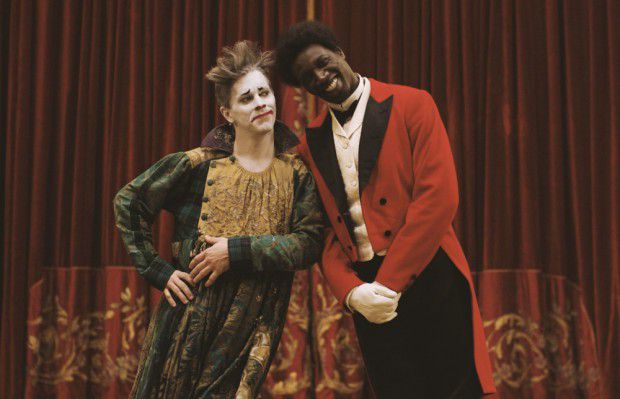
Best Friends Forever #BFF『Chocolat』 James Thiérrée & Omar Sy Interview
http://www.neol.jp/culture/52464/
- We see many films from America, and this might not be the side of America that many people here would know. Why did you decide to tell this particular story?
I'm a New Yorker grew up in New York for the most of my life. But I moved to Los Angeles in 2012. LA is humongous and there are so many neighborhoods and communities and little microcosmos that haven't been explored in the Hollywood mainstream industry and in film and television. And I thought, why not?
- I see.
It's right there. Literally, the block with Donut Time is right next to the studio. It’s so weird to me that this was the area where people just drive by but never really stop and get to know the area. So I thought I would like to explore it. It's sort of like an unofficial red light district, which I would say frequented by last decade mostly transgender sex workers. I knew that there would probably be millions of stories that could be told in this location.
So I called my producer up to tell him that I wanted to make a film about "the corner of Santa Monica and Highland." And that's all I had to say literally. He knew about it and understood what I was going for. He said, "all right, perfect, green lit."
And I had to start a whole research process, because I'm not going to go in there with Chris Bergoch, my co-screenwriter, and just make up something. We didn’t know much about the area. So we decided to start that whole research process that took a while, but in it, it was quite eye-opening, we got to meet Mya and Kiki. Mya was the one who really introduced us to everybody.
- How did you meet her?
She was at the LGBT center, which was about a block away from Donut Time. We were approaching women on the street, we were approaching people in the neighborhood, but they thought we were either police officers or journalists and we couldn't get to anywhere. So we decided to go to the LGBT center because it seemed easier to approach people. There was a nice courtyard and everything and they service youths at risk in the area. So we knew that there would be some people to talk to.
- And Mya was there.
Yes, we saw Mya from across the courtyard and we thought, "oh my gosh, she has such a look!” So we went over there, and we just said, "Hi, we're making a film. We want to know more about the neighborhood and your life experience here." And she was just like "Yeah! Sure! And I sing, so I want to sing!" [laughs] So I went, "OK, well it's not a musical, but we'll figure out a way for you to sing in the movie."
- What about Kiki?
We started hanging out with Mya at a local fast-food restaurant, and got to hear a lot of stories. A lot of anecdotes about what it was like there. And then one day Mya said, "I want you to meet my actor friend. She's the actor." So she brought Kiki who really just studied drama in high school. But I guess she was considered a performer amongst everyone. It was at that moment when I saw the two together. It was such a dynamic duo. They look different and yet they complement each other, and they finish each other's sentences. So there was something there I thought, "OK, if they can act, then we're set."
- Are they really like how they are in the film?
They are like that in terms of their wit, excitement, humor and energy. But Kiki is not like Sin-Dee. [laughs] She's never violent. Actually, outside of her circle, she's shy and introverted.
- That means she's a great actor then.
Yeah, yeah. She was able to turn it on really quick and turn it off. So anyway, that was when we just started figuring out what the plot line was going to be based on all these anecdotes that we heard. I told them from the very beginning that I wanted their approvals through every stage, it was very important… just because we were two cisgender white guys from outside of that world.
I always do that for every film, but especially with this, there haven't been many stories told about trans sex workers in the way that I think it's been respectful and heard their voice. So we gave them our 7-page treatment, and they loved it. They had a few notes but then we moved forward and started to flush it out, and we had workshops… And then even in post-production, at least Kiki was very helpful in terms of coming by and watching me edit and telling me what she thought.
- What were some of the directions that you gave them?
They understood my sensibility because of my previous films. It's based on the realism so it has to be real and also has to entertain. But I think it was Mya who actually said "I want this even funnier than your other films!" [laughs] She said, "I want this to really show how hard it is for the women out here, but at the same time I want you to make this hilarious." And I was like "Oh boy…" That's a hard balancing act.
But you know what? I think she was right. Because when I was hanging out with them at that restaurant all the time, they were so funny. And they always used humor to cope with their problems. And I thought if we didn't infuse that humor into the movie, it would be untruthful. So it just became to the point where we always had to make sure that we were balancing that comedy and pathos.
- Their lives are tough but I was laughing a lot throughout the film, and there was that right amount of lightness.
I honestly did not know how people were going to react. I thought it was going to be 50/50 quite honestly. Love and hate. But it was a nice universal acceptance of it because I think that people saw that it was genuine and we weren't making fun of. It was instead just seeing the real humor of life. And sometimes it does come from tragic places, but we all face tragic things all the time, and we use humor to get by. There are some filmmakers I really respect to do that, like Alexander Payne. "Nebraska" is tragic, right? But at the same time, you are laughing the whole time. Lars von Trier does it all the time. And I think that's the style and tone that speak to me, because it reflects real life.
- Also, their conversations sounded so real and so much fun to listen to. I loved the part where she said "you didn't have to Chris Brown that girl."
That was scripted. [laughs] That was my line that I'm still scared about. One day, Chris Brown is going to punch me in the face!
- Were there some lines they came up with?
There were some incredible lines. When Mya was in the car with the john, and the john goes "oh you know you want it" and she goes "oh you see right though me, don't you?" And that not only is a good line, and well delivered and funny, but LGBT critics have brought it up as an important line. Because they say it's one of the few times in a movie seeing that sort of interaction from the sex worker’s point of view. So they not only delivered funny lines, but they brought their voice to it, which I think is very important.
- I loved the scene where Mya was singing. She wanted to sing in the film, right?
But she hated our choice. [laughs] She wanted to sing Mariah Carey!
- That scene was so dreamy and beautiful though.
Thanks. That was fun to shoot. "Toyland" is a song from the film "Babes in Toyland" which is a famous Christmas musical. It meant a lot to me because I have a connection to the original "Babes in Toyland." But for her, she was just like "why do I have to do this?" But she did it well. Ultimately, she's very happy with it. And the fact that it's on the soundtrack, she's very happy.
- You said they were shy about acting in the last scene, but it was just great.
They were wonderful. I only did one take, which is dangerous. Because you never know if you could lose the digital file or something would be messed up. But I couldn't put them through it again, because I could see it was beyond acting. I frame the shot the way I wanted it. That was like how I envisioned the shot. But I didn't know they were going to be delivering such powerful performances. I don't get emotional on my own sets, but that was the one time where I got teary eyed. Because I was looking at them and "oh my god, I can't believe this is happening." They were wonderful.
- Before watching this film, I read some reviews online and their emphasis was on how it was shot by iPhones. But to be honest, I forgot about that in few minutes.
Good!
- Why did you shoot it with iPhones?
It did stem from a budgetary place, but then quickly, all the benefits revealed themselves. I knew that with the first time actors and with the non-professionals, it was going to be less intimidating, if not intimidating at all. Because everybody owns a smartphone now, even the women on the street with no money, they still have their smartphones. So when I shot this in their face, who cares? But if I shot the big 35mm camera in their face, it would take a while for them to get used to it.
And we were able to move the camera a lot faster being mobile. If you compare this film to my other films, there is a lot more movements in this one. And getting into little tiny places too. Donut Time is actually much smaller than it appears to be in the film.
- Why did you decide to call it "Tangerine"?
We couldn't figure out the title of the movie for a long time. We didn't want to be too on the nose, we wanted something that's not literal. We wanted something that would conjure up images. We threw that title down, and that was the title everybody started thinking about and talking about. And everybody had their own interpretation about it, which was nice for me that everybody could do whatever they want to do with the title. And it was more about the sense of color in the fruit. It just seemed to work. And then when I saturated the colors, it suddenly became the dominant hue.
- This is the film about people, not the film about LGBT people.
It's funny because James Ransone who plays Chester always says, "this is a movie about LA." And then other people would say, "this is a Christmas movie." And other people would say, "just think of it as a buddy movie." So there are many different ways you can go about pitching. But I think this is a romp through present day Los Angeles. [laughs] That's how we think of it.
- What did you think was the biggest thing you got through this experience?
I'm very critical of my own work, but I'm very happy with all the performances in this. It's the first time where I was happy with the entire cast. I didn't know where I was going to go next, I thought I might make a big puppet movie quite honestly. But this film sort of helped me set my path straight. My follow up, the new one that's in Florida is same sensibility. It focuses on children, but it's trying the same stuff. I think I'm staying in this wheelhouse for a little while, instead of making a big puppet movie [laughs]
関連記事のまとめはこちら
http://www.neol.jp/culture/
外部リンク
この記事に関連するニュース
-
「自分にとって何が大切なのかを知ることができた」Jamie xx “In Waves”インタビュー
NeoL / 2024年9月16日 17時0分
-
Message from Anna Umemiya: “I began treatment for breast cancer on July 31.”
OTONA SALONE / 2024年9月4日 16時30分
-
面接対策から日常会話まで、「日本語のオンラインプライベートレッスン」9月生・10月生の募集を開始!
PR TIMES / 2024年8月31日 10時40分
-
【ミスミ】機械部品調達のAIプラットフォーム「meviy」/ ハンドクレーン業界シェアNo.1のアイコクアルファがmeviyを採用
PR TIMES / 2024年8月30日 13時15分
-
IS:SUE discusses their group philosophy: "I’m ishu. I’m cool and amazing just the way I am"
Rolling Stone Japan / 2024年8月23日 12時0分
ランキング
-
1「SHOGUN」エミー賞受賞を喜ぶ人と抵抗ある人 日本人がアメリカで最多受賞した本当の理由
東洋経済オンライン / 2024年9月20日 13時0分
-
2「高齢者に炭水化物は毒」は大ウソである…長寿国では「パン、そば、うどん」をもりもり食べている事実
プレジデントオンライン / 2024年9月20日 15時15分
-
3朝食前に歯を磨かない人は「糞便の10倍の細菌」を飲み込んでいる…免疫細胞をヨボヨボにする歯周病菌の怖さ
プレジデントオンライン / 2024年9月20日 14時15分
-
4「ぜんたーい、止まれ!」その入場行進なんのため? 元体育主任が語る、運動会で廃止すべきこと3つ
オールアバウト / 2024年9月20日 20時35分
-
5「来来亭のラーメン」を16年以上毎日食べ続ける男性を直撃。体重の増減や健康診断の結果も教えてもらった
日刊SPA! / 2024年9月19日 15時54分
記事ミッション中・・・
記事にリアクションする
![]()
記事ミッション中・・・
記事にリアクションする

エラーが発生しました
ページを再読み込みして
ください









